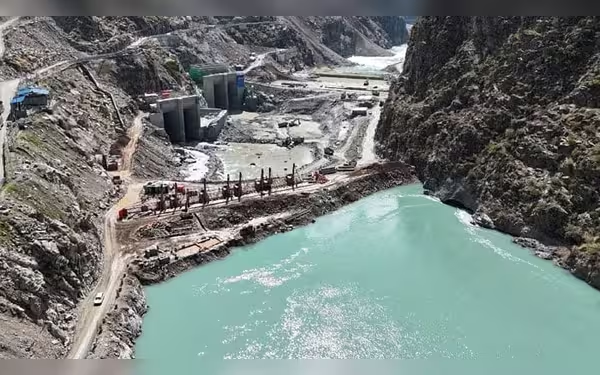Saturday, November 16, 2024 03:20 PM
Govt Allocates Funds for 32 Dam Projects to Combat Water Scarcity
- 32 dams funded to enhance water storage capacity.
- Diamer Basha Dam to significantly boost irrigation supplies.
- Provincial autonomy emphasized for effective water management.
 Image Credits: thenews
Image Credits: thenewsThe government funds 32 dam projects to enhance water storage and irrigation, addressing Pakistan's pressing water scarcity issues.
In a significant move to address the pressing water scarcity issues in Pakistan, the federal government has announced funding for the construction of 32 dams during the current fiscal year. This initiative, revealed in the National Assembly, aims to enhance the country’s water storage capacity and improve irrigation facilities across various provinces. Minister for Water Resources Musadik Malik emphasized that these projects are crucial for managing water resources effectively, especially in light of climate change and increasing demand for water.
According to Minister Malik, once completed, these dams will collectively have the capacity to store approximately 8,429,288 acre-feet of water. This substantial storage capability is expected to irrigate an additional 436,934 acres of land, thereby boosting agricultural productivity. The construction of these dams is not just about storing water; it is also about ensuring that surplus water during the flood season can be utilized for irrigation and drinking purposes when river flows diminish.
The financial commitment for these 32 dam projects amounts to Rs1,056.985.586 million. Among the notable projects is the Diamer Basha Dam, which will store 6.4 million acre-feet of water, significantly enhancing irrigation supplies to the existing 45 million acres of canal-irrigated land in the Indus Basin Irrigation System. This is a vital step towards ensuring food security and sustainable agricultural practices in the country.
In addition to the ongoing projects, several new initiatives are in the pipeline, including the Shyok Dam Multipurpose Project, Akhori Dam Project, Chiniot Dam Project, and Murunj Dam Project. These projects are designed to tackle the challenges posed by water scarcity and climate change, ensuring that Pakistan can meet its future water needs.
Minister Malik also highlighted the importance of provincial autonomy in water management, as water, including groundwater, is a devolved subject under the 18th Amendment. Each province is responsible for its legislation and implementation regarding groundwater monitoring and regulation. The National Water Policy 2018, which has been approved by the provinces, aims to provide a comprehensive framework for sustainable water resource management.
Furthermore, the policy recognizes groundwater as a critical resource and calls for the establishment of regulatory bodies to manage it effectively. Malik stated, "It is paramount to establish regulatory bodies for groundwater, with a mechanism ensuring sustainability, transparency, efficiency, safety, and affordability." This initiative is expected to enhance the management of groundwater resources, which are vital for agriculture and drinking water supply.
In a related discussion, Minister for Industries and Production Rana Tanveer Hussain addressed a question regarding Russia’s offer of assistance for Pakistan Steel Mills (PSM). He clarified that, as of now, there has been no formal communication with Russia regarding the restoration of PSM, although discussions have taken place. This highlights the ongoing efforts to revitalize key industries in Pakistan.
Lastly, the Ministry for National Health Services informed the National Assembly that Universal Health Coverage (UHC) for Islamabad commenced on January 1, 2022, covering all permanent resident families until December 15, 2023. This initiative reflects the government’s commitment to improving healthcare access for its citizens.
The funding of 32 dam projects represents a proactive approach by the government to tackle water scarcity and enhance agricultural productivity in Pakistan. As these projects progress, they hold the potential to transform the water landscape of the country, ensuring that future generations have access to this vital resource. The emphasis on provincial autonomy and sustainable management practices further underscores the importance of collaborative efforts in addressing the water crisis effectively.













